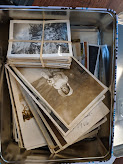Archiving a Life Story
Most of us comb through a lifelong collection of personal papers and photos either when we have plenty of free time (typically in retirement) or when we have to deal with the belongings of a deceased loved one.
At Oxford Duplication Centre, our archivists process every type of collection imaginable. We often acquire personal papers and mementos, things that had special meaning to the owner, not only letters and photos but also locks of hair, newspaper clippings and documents. Some collections arrive neatly organised and others arrive heaped into makeshift containers.
“Not everyone values this stuff but if you archive it, it will be there for somebody in a later generation. There may be one person who really cares about their family history and will be glad to have it.” Many clients have collections which are personally significant materials.
Most of us comb through a lifelong collection of personal papers and photos either when we have plenty of free time (typically in retirement) or when we have to deal with the belongings of a deceased loved one.
All too often the job seems so daunting and overwhelming that our natural response is to get discouraged and say, “I don’t know where to begin” or “It’s too much; I’ll do it some other time” or worse, “I’ll just get rid of it all.”
At Oxford Duplication Centre, our archivists process every type of collection imaginable. We often acquire personal papers and mementos, things that had special meaning to the owner, not only letters and photos but also locks of hair, newspaper clippings and documents. Some collections arrive neatly organised and others arrive heaped into makeshift containers.
“Not everyone values this stuff but if you archive it, it will be there for somebody in a later generation. There may be one person who really cares about their family history and will be glad to have it.” Many clients have collections which are personally significant materials.
These may include diaries and letters handed down through generations or photographs of significant life events or even a set of old tickets stubs. These paper-based collections deteriorate over time, but making small changes in storage and handling can have a huge impact on the lifespan of the materials.
The best protection for your private collections of books, diaries, papers, photographs, and prints is to have your archives digitised into easy to access digital formats.
Once digitised, we would suggest storing all collections in a cool, dry, stable environment with good air circulation and limited light exposure. A collection’s lifespan can be significantly improved just by keeping temperatures around 70 degrees Fahrenheit and relative humidity (RH) under 55%.
Warm regards
Cheryl
Director
Oxford Duplication
The Centre for Archiving Audio Video Image and Text
29 Banbury Road
Kidlington
OX5 1AQ
01865 457000
Reduced Opening Hours for COVID-19:
Monday to Friday 10-3pm



Comments
Post a Comment